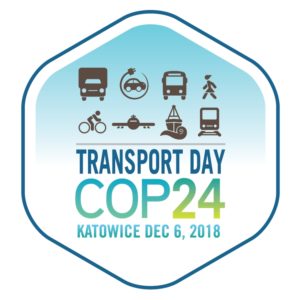Thursday, 6 December 2018
Katowice, Poland
ABOUT THE EVENT
Transport is currently responsible for about one fifth of the global CO2 emissions and nearly a third of transport-related CO2 emissions originate from urban passenger transport. Transport also contributes with at least half to the air pollution in cities, seriously affecting the health of its inhabitants. The Paris Agreement on Climate Change fully recognises the importance of non-State actors in implementing the agreement. City-level activities in the transport sector are becoming increasingly important, especially due to the multiple benefits of urban mobility action, reducing CO2 while at the same time improving air quality, tackling congestion, quality of life, traffic safety and improving public health.
After a one-year break, we are very pleased to bring back Transport Day at COP24. 2018 Transport Day highlighted the strong role of cities in reducing greenhouse gas emissions and improving air quality by implementing measures in the transport sector. It showcased best practice examples from around the globe, with a range of presentation from various EU cities involved in the European Commission-funded CIVITAS Initiative. CIVITAS brings over 15 years of testing integrated packages of policies and measures to address transport, energy and environmental objectives. Importantly, the event addressed how national governments can support the potential of cities through framing activities for successful sustainable urban mobility action (e.g. national legislation, common planning tools, empowering cities, funding to cities). Ultimately the event aimed to lead to the improved treatment of urban mobility in the Nationally Determined Contributions being developed by States in 2019 and submitted to the UNFCCC in 2020.
Over the last years the transport sector already has made considerable progress in mobilizing action amongst non-state actors on transport and climate change, especially through the Paris Process on Mobility and Climate (PPMC). PPMC is a joint initiative of the Partnership on Sustainable, Low Carbon Transport (SLoCaT), the largest multi-stakeholder partnership on sustainable transport and Movin’On by Michelin. The PPMC, created in 2015 prior to COP21 has helped in developing the knowledge base on transport and climate change, mobilize unprecedented action by non-state actors through the mobilization of initially 15, now 22 major initiatives on transport and climate change. PPMC brings extensive knowledge and vision to decarbonizing transport through the development of a Global Macro-Roadmap: An Actionable Vision for Transport Decarbonization.
This Transport Day was jointly organized by the European Commission’s CIVITAS Initiative, SLoCaT on behalf of the PPMC, and was hosted and supported by the City of Katowice.
Press release of 2018 Transport Day is available here.
PROGRAMME
| Transport Day 2018 at COP24 | ||
|---|---|---|
| 09:00 – 10:00 | OPENING SESSION | Moderation: Karen Vancluysen, Polis |
| 09:00 | Welcome | Marcin Krupa, Mayor, City of Katowice |
| 09:05 | Introduction | Karen Vancluysen, Polis |
| 09:15 | Decarbonising Transport – Vision Zero Towards 2050 | Violeta Bulc, European Commissioner for Transport |
| 09:35 | Transport Decarbonisation Alliance –
Countries, Cities and Companies working together |
José Mendes,
Vice-Minister for Mobility, Portugal |
| 09:50 | Responses from European
Commissioner for Transport |
Commissioner Bulc and
José Mendes |
| 10:00 – 11:00 | MORNING PLENARY
From Global Promises to Local Action: How national |
|
| 10:00 | Presentation: National framework conditions for sustainable urban transport, Susanne Böhler-Baedeker, Rupprecht Consult | |
| 10:15 |
|
Discussion moderated by: Paulina Potemski, Deputy Head of the Climate and Energy Unit, French Ministry for an Ecological and Solidarity-based Transition (MTES) |
| 11:00 -11:30 | COFFEE BREAK | |
| 11:30 – 12:45 | MORNING BREAKOUT SESSIONS | |
| Breakout Session 1A:
Electrification of Public Transport
|
Moderator: Artur Perchel, UITP
Philip Turner, UITP Malgorzata Kubiszewska, Polish Ministry of Investment and Economic Development Pawel Jankowski, MZA Warsaw Magda Malewska, ABB Oliver Lah, Wuppertal Institute for Climate, Environment and Energy |
|
| Breakout Session 1B:
Financing Transformation & Low Carbon Mobility
|
Moderator:
Ramón Cruz, ITDP Ahmed Al Qabany, Islamic Development Bank (IsDB) Marta Sánchez Borràs, European Investment Bank (EIB) Daniel Moser, GIZ Karl Mallon, CBI Board Member Carlos de Freitas, FMDV
|
|
| Breakout Session 1C:
Adaptation: Adapting to new climate in transport sector
|
Moderator: John Dora, John Dora Consulting Limited
Carole Escolan, International Union of Railways (UIC) Andrew Quinn, University of Birmingham Jordan Harris, AdaptChile Regina Asariotis, United Nations Conference on Trade and Development (UNCTAD) Aage Jorgensen, Nordic Development Fund Laure Herbert, World Association for Waterborne Transport Infrastructure (PIANC) |
|
| 12:45 – 13:45 | LUNCH BREAK | |
| 13:45 – 14:45 | AFTERNOON PLENARY
Sustainable Urban Mobility Plans: Planning for decarbonisation of transport in cities |
|
|
Discussion moderated by Siegfried Rupprecht, Rupprecht Consult | |
| 14:45 – 16:00 | AFTERNOON BREAKOUT SESSIONS | |
| Breakout Session 2A:
Climate Action in Urban Transport
|
Moderator: (led by TUMI and MobiliseYourCity Partnership)
Wei-Shiuen Ng, ITF Daniel Moser, TUMI Markus Delfs, MobiliseYourCity Partnership Marie Jamet, IFEU Institute Ramón Cruz, ITDP |
|
| Breakout Session 2B:
Innovations in Low Carbon Transport
|
Moderator: Cecile Texier, VP Sustainability and CSR, Alstom
Jonas Stromberg, Scania Wolfram Schwab, Alstom Nicolas Beaumont, Michelin Rasmus Valanko, World Business Council for Sustainable Development (WBCSD) |
|
| Breakout Session 2C:
Walking & Cycling
|
Moderator: Marcel Braun, Rupprecht Consult
Participants: Liv Rakel Øvstedal, Norwegian Public Roads Administration Sylvie Banoun, Ministry for Environment, Energy and the Sea, France Pedro Gouveia, City of Lisbon Daan Pelckmans, City of Gent |
|
| 16:00 – 16:30 | COFFEE BREAK | |
| 16:30 – 17:00 | REPORTING BACK FROM BREAKOUT SESSIONS | Session moderators |
| 17:00 – 18:00 | CLOSING PLENARY
Transport and Climate Change Key Messages for UNFCCC Process and the Way Forward |
|
|
Discussion moderated by Maruxa Cardama, SLoCaT | |
|
18:00
|
Transfer to cocktail reception (hosted by the City of Katowice) by hydrogen-powered buses Buses leave at 18:15, 18:20 and 18:25 Venue: Pałac Goldsteinów (Goldstein Palace), pl. Wolności 12a
|
|
MEETING VENUE
The Transport Day took place at “Miejski Dom Kultury”, ul. Markiefki 44a, 40-213 Katowice. It is located about 10-15 min. walk from the COP24 congress centre (“Międzynarodowe Centrum Kongresowe”).





